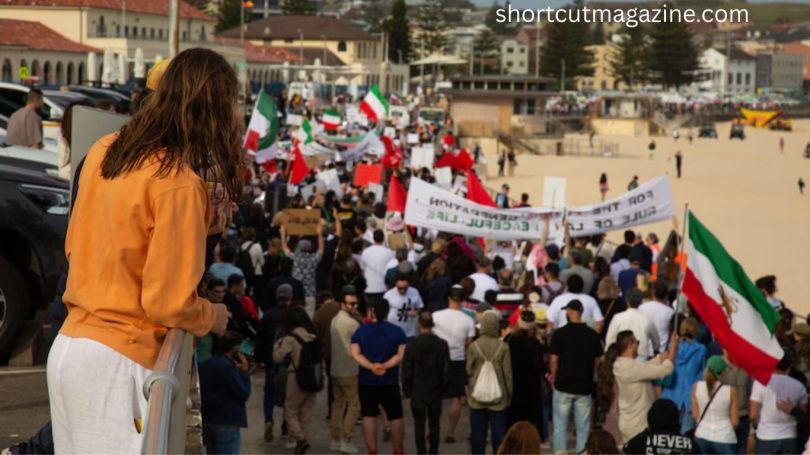When Iranian-born refugee Bijan Kardouni heard the news that Tehran had been linked to at least two antisemitic attacks on Australian soil, his first reaction was disappointment. But the feeling didn’t last long. Disappointment quickly turned into fear.
For Kardouni, the memories were personal. He fled Iran exactly eight years ago to escape anti-gay persecution. Now, hearing that the Iranian Revolutionary Guard Corps (IRGC) — a powerful military group that answers directly to Iran’s Supreme Leader — was allegedly operating in Australia left him unsettled.
“It’s a very scary thought, how powerful they can be … They have some people here who would find us and attack us,” Kardouni told triple j hack.
For many in Australia’s growing Iranian community, the revelations have not only stirred fear but also distrust within their own diaspora.
“It creates this fear that, okay, how can I trust the Iranian community here? How can I trust if they’re a spy or not?” he said.
Read More: Devoted Generations Unite at Hope Davey’s Beloved Horseshoe Pits in early 1980s
Iranian Community Caught Between Relief and Concern
As of June 2023, nearly 86,000 Iranian-born people were living in Australia, according to the Department of Home Affairs. That figure has more than doubled since 2013, as thousands fled political repression and anti-regime crackdowns in Iran.
Many of these migrants oppose Tehran’s authoritarian government. For them, the Australian government’s decision to sever diplomatic ties and shut down Iran’s embassy was a welcome move.
“They kidnap people, they fund terrorist organisations, they take hostages,” said Siamak Ghahreman, President of the Australian-Iranian Community Organisation.
“We are really happy to see them gone and we are not going to miss them.”
His organisation had submitted evidence to a 2022 Senate inquiry urging Canberra to close the embassy and list the IRGC as a terrorist organisation.
Now, with both demands met, Ghahreman says the community feels vindicated. Yet beneath that relief lies unease.

Kardouni worries that ordinary Australians may fail to distinguish between regime loyalists and the wider Iranian community.
“Me as a refugee, I came here because I couldn’t live there and my life was in danger. We are separate from the regime, we don’t agree with what they are doing.”
Another practical concern is the closure of Australia’s embassy in Tehran. Many fear the move will make it far harder for Iranians seeking to reunite with family or apply for visas.
Jewish Australians: A Mix of Fear and Vindication
For members of Australia’s Jewish community, the government’s announcement carried a bittersweet resonance.
On one hand, it confirmed what many suspected after the October 7, 2023 Hamas attacks on Israel — that antisemitic threats in Australia were real and, in part, driven by international actors.
“We haven’t felt safe,” said Rabbi Gabi Kaltmann from Melbourne’s Ark Centre.
“People have really let loose on Jewish institutions, synagogues and community members … This is sort of an ‘I told you so’ moment. Now we see that Iran doesn’t just sow the seeds of chaos around the Middle East but also here.”
But if the revelation confirmed fears, it didn’t necessarily bring comfort.
“Knowing that they were solely driven to make us fear going to shul, make us fear going to our local deli — it’s a very scary thing, just because we’re Jewish,” said Danielle Tischmann, co-president of the Australasian Union of Jewish Students.

For many Jewish Australians, the news highlighted the growing strain on social cohesion. After firebombing attacks on Melbourne’s Adass Israel synagogue and Sydney’s Lewis’ Continental Kitchen last year, some online voices blamed shadowy “Zionist lobbies” or the Israeli government itself.
“It wasn’t sympathy we were seeing, or concern. It was: is it the Zionist lobby? Is it the Israeli government? It’s been a moment to reflect on the support Jewish students have not received during the rise in antisemitism,” Tischmann added.
Palestinian Australians: Relief Mixed with Frustration
The diplomatic fallout has also reverberated in Australia’s Palestinian community.
University student Raneem, who asked not to use her surname, said Iran’s confirmed involvement in the attacks vindicated the pro-Palestinian protest movement in Australia.
“We’ve been saying it for two years now, that ours is an anti-war, anti-racist movement. We’ve asserted the whole time that this rise in antisemitic attacks has nothing to do with the pro-Palestinian movement [or] protests,” she explained.
For Raneem, Prime Minister Anthony Albanese’s press conference proved what activists had long argued — that antisemitic violence was not tied to Palestinian solidarity protests.

But along with that vindication comes frustration.
The Palestinian movement in Australia has repeatedly called for stronger sanctions against Israel, including expelling the Israeli ambassador, halting military-related exports, and holding Israeli leaders accountable for alleged war crimes.
Raneem says Canberra’s quick, decisive action against Iran demonstrates that the government has the power to apply similar diplomatic measures elsewhere — but has chosen not to.
“Anthony Albanese has proved that what we’re requesting is not unreasonable. It’s something that can be used against international actors when there are allegations of wrongdoing,” she said.
Balancing Security and Social Cohesion
Australia’s decision to cut ties with Iran and classify the IRGC as a terrorist organisation represents one of the strongest diplomatic moves Canberra has made in recent years. It sends a message of zero tolerance for foreign interference and state-sponsored intimidation.
But the impact on Australia’s diverse communities is complex.
For Iranians, it means a renewed sense of safety — but also fear of being misunderstood, or of losing vital consular services.
For Jewish Australians, it brings a grim confirmation of long-standing concerns — yet little reassurance about their safety.
For Palestinians, it validates claims that antisemitic attacks were not tied to their protests — but underscores what they see as double standards in foreign policy.
Australia now faces the challenge of ensuring that these policy shifts strengthen national security without deepening social divides.
Frequently Asked Questions:
Why did Australia cut diplomatic ties with Iran?
Australia severed ties with Tehran after revelations that the Iranian Revolutionary Guard Corps (IRGC) was linked to antisemitic attacks on Australian soil. The government also listed the IRGC as a terrorist organisation to protect national security and prevent foreign interference.
How many Iranians live in Australia?
As of June 2023, nearly 86,000 Iranian-born people lived in Australia. The community has more than doubled since 2013 due to political repression, economic hardship, and anti-regime protests in Iran.
How has the Iranian community in Australia been affected?
Many Iranian Australians support the government’s decision, viewing it as a stand against Tehran’s oppressive regime. However, the move has also created fear and mistrust within the community, with some worrying about spies or regime sympathisers. Others are concerned that closing the embassy in Tehran will make visa and family reunification processes more difficult.
Are Iranian Australians supportive of the Iranian government?
Most Iranian Australians oppose the Iranian regime. Many fled the country because of persecution, lack of freedoms, or fear for their lives. Community leaders stress that Iranian Australians should not be viewed as a security threat.
How has the Jewish community in Australia reacted?
Jewish Australians see the revelations as a confirmation of long-standing fears about Iranian involvement in antisemitic threats. While many feel vindicated, they also stress that this news does not necessarily make them feel safer, as antisemitism remains a growing concern.
What about the Palestinian community’s perspective?
Palestinian Australians argue that the revelations prove their protests are peaceful and not connected to antisemitic attacks. However, they are frustrated that Canberra acted quickly against Iran but has not taken equally strong measures against Israel over the war in Gaza.
What does the closure of the Iranian embassy mean for Iranians?
The embassy’s closure complicates visa applications, travel documents, and family reunification. Many fear it will isolate Iranians in Australia from essential consular services.
Conclusion
Australia’s decision to cut diplomatic ties with Tehran and blacklist the IRGC as a terrorist organisation marks a historic shift in foreign policy — but its consequences reach far beyond politics. For Iranian Australians, it is both a relief and a source of unease: relief that the regime’s influence has been curtailed, and unease about mistrust, stigma, and the loss of vital consular services. For Jewish Australians, it confirms long-held fears of Iranian-backed antisemitism, yet it offers little comfort against rising hostility at home. For Palestinian Australians, it validates the peaceful nature of their movement, while exposing what they see as inconsistencies in Canberra’s foreign policy.




